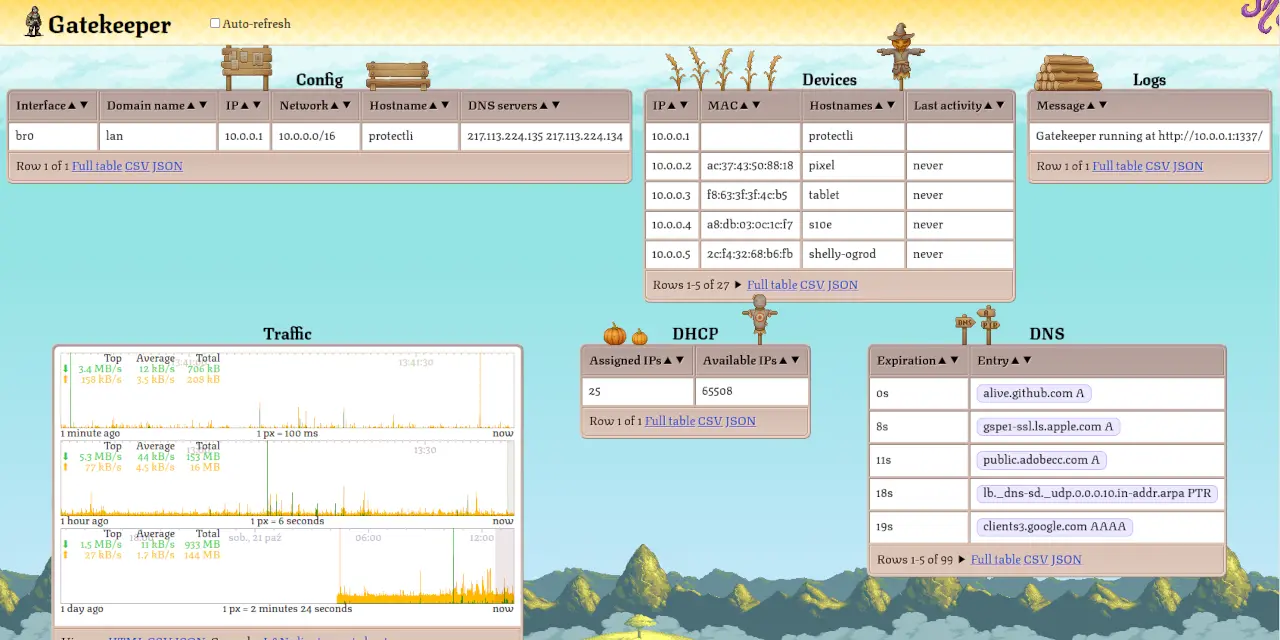

In terms of types of users I agree with what you’re saying but I also think that there are some shades of gray in between. There are people who love to tinker and would manually configure every service on their router, compiling everything from scratch, reading manuals, understanding how things work (they’ll probably choose dnsmasq, systemd-networkd, graphana over Gatekeeper). In my experience this approach is pretty exciting for the first couple of years & then gradually becomes more and more troublesome. I think Gatekeeper’s target audience are the people who would like to take ownership of their network (and have some theoretical understanding) but don’t want to fully dive into the rabbit’s hole and configure everything manually.
In terms of problem solved: I agree that Gatekeeper solves a similar problem. I think it’s different from those projects because it tightly integrates all of the home gateway functions. While this goes against the Unix philosophy, I think it creates some advantages:
- Possibility of cross-cutting features.
- Better performance (lower disk usage, lower RAM usage, lower CPU load).
- Seamless integration.
Functions of home routers are conventionally spread out over many components (kernel & a bunch of independently developed userspace tools) which talk to each other. Whenever we want to create a cross-cutting feature (for example live traffic graphs) we must coordinate work between many components. We need to create kernel APIs to notify userspace apps about new traffic, create userspace apps to maintain a record of this traffic & a web interface to display it. It’s difficult organizationally. In a monolith, where all code is in one place, such cross-cutting features can be developed with less friction.
From the performance point the conventional approach is also less efficient. The tools must talk to each other. Quite often through files (logs & databases). It’s wearing down SSDs & causing CPU load that could be otherwise avoided. A tightly integrated monolith needs to write files only periodically (if ever) - because all data can be exchanged through RAM.
From the complexity standpoint the conventional approach is also not great because each of the tools needs to know how to talk with the others. This is usually done by administrator, configuring every service according to its manual. When everything is built together as a monolith, things can “just work” and no configuration is necessary.
Edit: Please don’t be offended by my verbosity. From your question I see that you know this stuff already but I’m also answering to the fresh “selfhosted” audience :)


I understand that your goal is to learn something new.
In my opinion ambitious, goal-oriented projects may either backfire or turn you into a legend. There will be many issues along the way and while they are all ultimately solvable, the difficulty may kill your motivation. Alternatively, if you manage to power through, then after some period of learning (potentially years) and keeping the fixation on specific problem you might emerge as a domain expert. Either way it’s a risky bet.
If I might leave some advice for newcomers it would be to learn how to perform some simple tasks & focus on creating projects that you’re confident can be built from things you already know. Over time you’ll increase the repertoire of tasks that you can perform, and therefore be able to build increasingly advanced projects.